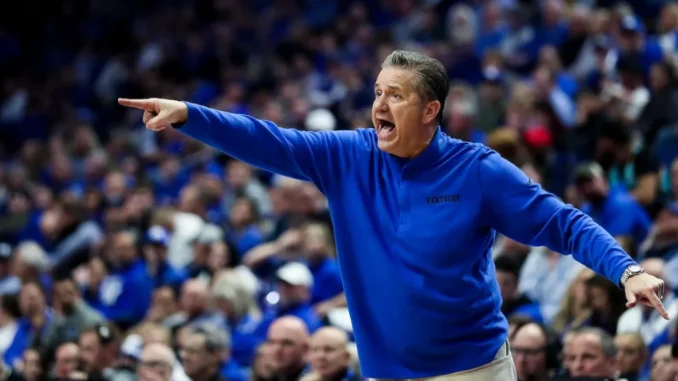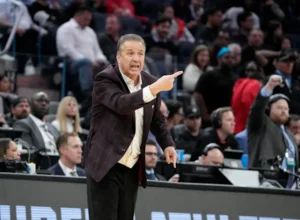
Former Kentucky coach John Calipari’s support for Trump’s executive order triggers backlash from fans, players, and parents—raising fresh concerns about NIL, hypocrisy, and the future of college basketball recruitment.
John Calipari has never been one to shy away from speaking his mind, but his latest public endorsement may have opened a can of worms he wasn’t quite prepared to handle. The former Kentucky Wildcats coach—now leading the Arkansas Razorbacks—found himself at the center of a heated social and political firestorm after voicing support for former President Donald Trump’s recent executive order aimed at pay-to-play college athletics and the protection of women’s sports.
The statement, posted on X (formerly Twitter), read:
“I am encouraged by the President’s executive order today. This is an important step forward and will create opportunity for meaningful dialogue… I am encouraged by President Trump’s executive order and the dialogue that will be created to protect and grow life-changing opportunities for young people.”
But the backlash was instant—and brutal.
It wasn’t just fans and politically-opposed critics taking aim at Coach Cal. Some of the most biting responses came from within the college basketball community itself, including the parents of high-profile recruits.
Jarrett Lewis, father of 2025 elite prospect Acaden Lewis, didn’t hold back in his response. Acaden recently decommitted from Kentucky, and his father’s comment hinted that Calipari’s alignment with political moves that could potentially hurt athletes didn’t sit right.

“SMH. How many Executive Orders have you supported that will Adversely Impact Coaches Salaries?” Lewis tweeted, making it clear that if Calipari was eager to support restrictions on player earnings, he should also be prepared to see his own seven-figure salary examined under the same moral lens.
Fans were quick to jump on the irony as well. One post went viral, using a gif of Mr. Rogers slowly putting on a clown mask—symbolizing the public perception of Calipari as someone who claims to advocate for young athletes, but may in fact be undermining their financial future behind the scenes.
This controversy exposes the deep divide that still surrounds Name, Image, and Likeness (NIL) policies in college sports. On one hand, there are concerns about unregulated third-party collectives and pay-for-play schemes that muddy the amateur waters. On the other hand, today’s student-athletes have more awareness than ever of their value and rights. They expect—and demand—transparency, fairness, and support from the institutions and individuals who benefit from their talents.
John Calipari earned more than $86 million during his time at Kentucky. Now at Arkansas, he continues to be one of the highest-paid coaches in college basketball. To critics, that makes his endorsement of policies that could limit athlete earnings not just questionable—but hypocritical.
“It’s all about control,” one former SEC assistant coach said anonymously. “Coaches like Calipari want NIL, but only on their terms. When they see players making money through other channels, they panic—because it shifts the power dynamic.”
For Arkansas fans, the reaction was more divided. While some expressed concern that Coach Cal’s stance could make it harder to land top-tier recruits in the NIL era, others appreciated his emphasis on education, structure, and long-term development. One Razorbacks fan account even defended Calipari, saying, “He’s not against NIL—he’s just against chaos. There’s a difference.”
Still, the broader college basketball community isn’t convinced.
The timing of Calipari’s endorsement is also suspect, as the summer recruiting circuit heats up and programs battle it out for commitments from elite high school and transfer talent. In an era where athletes are making decisions based not just on playing time and tradition, but also on how coaches and institutions handle NIL, optics matter—and right now, Coach Cal’s are fuzzy at best.
The biggest risk for Calipari? Losing credibility with the new generation of players who have grown up understanding their worth. These are athletes raised on social media branding, influencer marketing, and digital entrepreneurship. They know how to build platforms. They know how to monetize their image. And most importantly, they’re watching who’s really in their corner.
This incident might be a PR blip, or it might signal a bigger shift in how recruits and their families perceive John Calipari going forward. Either way, it’s a reminder that in today’s game, the scoreboard isn’t just about wins and losses—it’s also about trust, alignment, and authenticity.
College basketball is evolving, fast. Coaches who adapt will thrive. Coaches who don’t? They risk getting left behind.
Leave a Reply